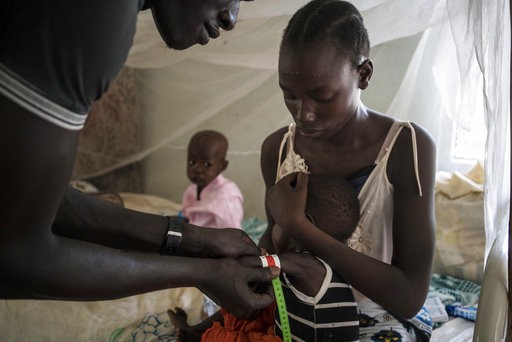Popular Reads
Top Results
Can't find what you're looking for?
View all search resultsPopular Reads
Top Results
Can't find what you're looking for?
View all search resultsThree African countries chosen to test 1st malaria vaccine
Change text size
Gift Premium Articles
to Anyone
 In this photo taken Monday, March 20, 2017, a young mother tries to calm her son, who is suffering from severe acute malnutrition, as he has his arm circumference measured as an indicator of malnutrition at Al Sabbah Children's Hospital in Juba, South Sudan. The world's largest humanitarian crisis in 70 years has been declared in three African countries on the brink of famine, just as President Donald Trump's proposed foreign aid cuts threaten to pull the United States back from its historic role as the world's top emergency donor. (Mackenzie Knowles-Coursin/UNICEF via AP)
In this photo taken Monday, March 20, 2017, a young mother tries to calm her son, who is suffering from severe acute malnutrition, as he has his arm circumference measured as an indicator of malnutrition at Al Sabbah Children's Hospital in Juba, South Sudan. The world's largest humanitarian crisis in 70 years has been declared in three African countries on the brink of famine, just as President Donald Trump's proposed foreign aid cuts threaten to pull the United States back from its historic role as the world's top emergency donor. (Mackenzie Knowles-Coursin/UNICEF via AP)
T
hree African countries have been chosen to test the world's first malaria vaccine, the World Health Organization announced Monday. Ghana, Kenya and Malawi will begin piloting the injectable vaccine next year with young children.
The vaccine has the potential to save tens of thousands of lives if used with existing measures, the WHO regional director for Africa, Dr. Matshidiso Moeti, said in a statement. The challenge is whether impoverished countries can deliver the required four doses of the vaccine for each child.
Mosquito-borne malaria infects more than 200 million people worldwide every year and kills about half a million, most of them children in Africa. Bed netting and insecticides are the chief protection.
A global effort to counter malaria has led to a 62 percent cut in deaths between 2000 and 2015, WHO said. But the U.N. agency has said in the past that such estimates are based mostly on modeling and that data is so bad for 31 countries in Africa — including those believed to have the worst outbreaks — that it couldn't tell if cases have been rising or falling in the last 15 years.
The vaccine will be tested on children five to 17 months old to see whether its protective effects shown so far in clinical trials can hold up under real-life conditions. The vaccine has taken decades of work and hundreds of millions of dollars to develop.
Malaria spreads when a mosquito bites someone already infected, sucks up blood and parasites, and then bites another person.
WHO is hoping to wipe out malaria by 2040 despite increasing resistance problems to both drugs and insecticides used to kill mosquitoes.









